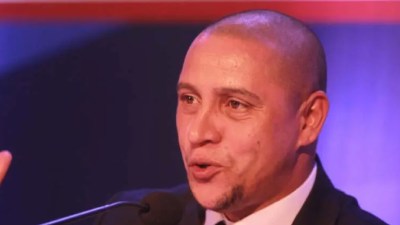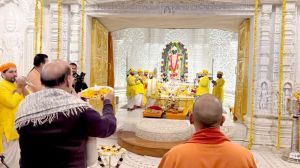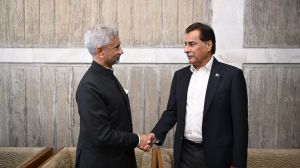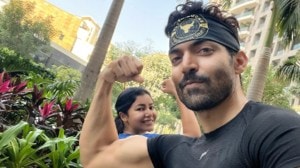Vajpayee clears the way
The entire non-BJP political segment faces an unprecedented dilemma. In fact, it is not even a dilemma. A dilemma presupposes a choice. Here...

The entire non-BJP political segment faces an unprecedented dilemma. In fact, it is not even a dilemma. A dilemma presupposes a choice. Here, one is at a T-junction: turn left and run into a cul de sac, Sonia Gandhi8217;s figure looming at the top of the lane. Turn right and there is Vajpayee clearing the way through the thicket making it an attractive, hospitable route. But the crowds cheering all along this road have a large proportion from the BJP, a party this huge, bewildered segment is habitually resistant to.
Like the prophets in the Old Testament, has Vajpayee become larger than the flock he leads? From those brooding heights, will he dwarf the party or guide it to its largest expansion ever? This latter outcome is what some of his cohorts would wish. A more practical proposition is what his vision appears to delineate: to weave a vast coalition representative of India8217;s pluralism and leave a strong central column, chiseled and free of the rough edges which made BJP so forbidding to this vast majority of the uninitiated.
The scene would have been much more wholesome had there been a competitive opposition at the national level. I am unable to induce any optimism on the Congress as a party of the future. It may have played its historic role in keeping one end bottled up, leaving the spaces wide upon for Vajpayee8217;s evolution as one of the best prime ministers the Congress never had.
Despite recent effort at simulating some movement at the top, the general image of the Congress is that of a limp, lifeless, intellectually defunct coterie content with their sausage cushions at CWC meetings. There is a Congress spread across the country but it is more in the nature of a residual leftover from a once widespread national habit.
The point is not Sonia Gandhi8217;s foreign origin. That issue is raised partly to keep her in play as a weak counterpoint. The real problem is the country has not seen her paces as an articulate, inspiring leader and organiser. That the party has not broken up is not because she provides some glue but because the leaders are petrified of being jobless. A strongly recommended sting operation would be to record what Sonia8217;s 8216;8216;loyalists8217;8217; murmur to all behind her back and to have a screening of these clips at the next CWC.
I believe Sonia Gandhi is a handicap to the party today and will be more so in the future should she, by some miracle, emerge on top of some coalition. It is probably rank bad manners to say such things but sometimes harsh truths should not be held back. I doubt if Indian society is evolved to a point where it will accept a foreign, Christian prime minister. So far Dr Abdul Kalam has come across as the representative of a catholic, broadminded system. But the appearance of the two highest offices in minority hands will give such a handle to a hundred Togadias as to bring into disrepair the harmonious edifice
Vajpayee is building brick by brick, after that one unforgivable disaster of Gujarat.
The reason why these things are not said publicly is because it is generally recognised that Sonia8217;s elevation would entail such unspeakable national confusion that it will never come to pass. If this understanding has been internalised by every senior Congress leader, more is the puzzle why the lady still looms as the party8217;s supervising deity. Every few months we hear Priyanka is likely to be fielded and then it fades out as rumour.
While we await the Congress gameplan, the prime minister is embarked on a dual process: social and political harmonisation of the subcontinent and beyond with China, for instance and a churning of the minds. On the Indo-Pak track three processes are on: a dismantling of terrorist camps on the other side, contacts to set up the mechanism for the composite dialogue and more CBMs to add to an accelerated pace of general normalcy in the air.
An important point made by President Musharraf and Foreign Minister Kasuri at their press conferences in Islamabad on January 6 was the role of the media: the media8217;s support, they said, was imperative for the peace process to succeed. The official media in Pakistan has already taken its cue: the profile of Vajpayee telecast on PTV on January 5 was not just balanced but even adulatory. The Indian media has been generally positive. Indeed, even Panchjanya, the RSS organ, has once again picked up the thread it had left after Agra. Editor of Jang Mahmud Shaam has received a communication from the Panchjanya editor, Tarun Vijay, to revive the joint Panchjanya-Jang essay competition on Indo-Pak peace.
But there are mindsets, some in India, but on a more extensive scale in Pakistan, which constitute the biggest threat to the peace process. Powerful newspapers like Nawa-e-Waqt are still spewing venom out of synch with the popular goodwill this reporter witnessed when a parliamentary delegation visited Pakistan in August and during the SAARC summit.
Tension sometimes becomes a condition of normalcy, a state of being which somehow bestows a sense of parity, equality. Absence of tension, by the same token, comes across as a consequence of some capitulation. People of the subcontinent, Vajpayee told SAARC, had once fought colonialism together in the 1857 war of Independence. The spin Nawa-e-Waqt has given to this statement takes one8217;s breath away: 8216;8216;Vajpayee considers united action in the past as more important than the more recent partition8217;8217;! It said 8216;8216;Like the Congress, neither is Vajpayee willing to accept partition nor the two nation theory8217;8217;. What an allegation against a man who visited Minar e Pakistan to underscore India8217;s acceptance of Pakistani nationhood.
In another editorial, Nawa-e-Waqt quotes Punjab Governor Khalid Maqbool chastising jehadi groups who stand in the way of a liberal polity. It lashes out at the governor and Musharraf and Jamali: 8216;8216;Don8217;t fool yourselves that your entreaties have brought India to the negotiating table. It is the sacrifice of the jehadis that has forced India to the negotiating table8217;8217;. These are powerful interests living in the past. Civil society in Pakistan is increasingly isolating these lobbies.
The Vajpayee-Musharraf statesmanship must further circumscribe these already narrow constituencies by persuasion on the one hand and mobilising civil society on the other.
- 01
- 02
- 03
- 04
- 05































